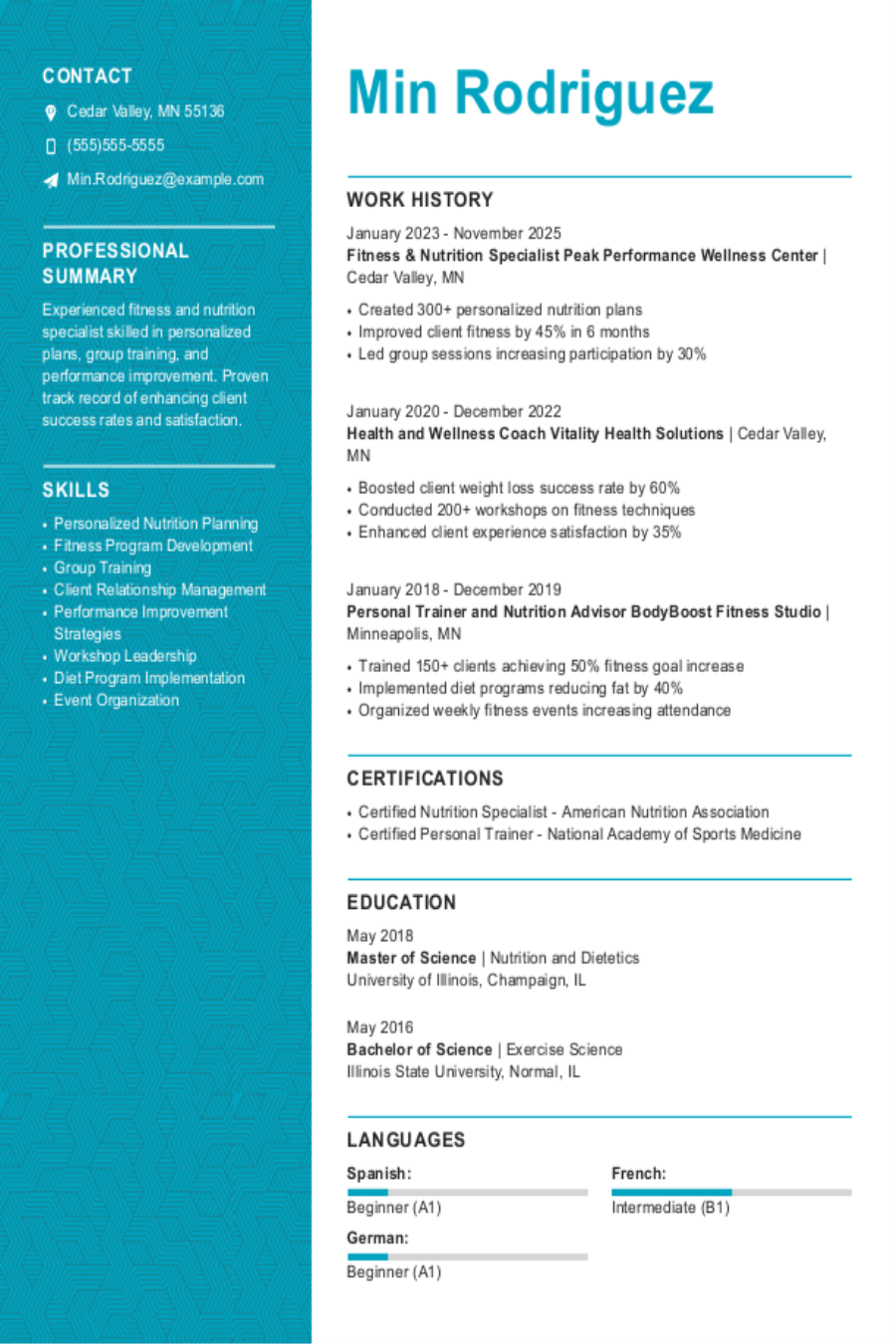Popular Editorial Assistant Resume Examples
Entry-level editorial assistant resume
An entry-level resume for an editorial assistant should highlight relevant coursework, internships, writing samples, and skills such as editing, communication, and attention to detail to demonstrate readiness for the role.
Focuses on goals: The applicant demonstrates a strong foundation in editorial work, emphasizing ongoing professional development through strong editing experiences and a commitment to improving publication quality and reader engagement.
Prioritizes readability: Choosing a simple resume template ensures clarity, helping recruiters quickly spot key qualifications and experiences without unnecessary distractions. A clean layout improves readability and draws attention to your strengths seamlessly.
Mid-career editorial assistant resume
A mid-career editorial assistant resume should emphasize a combination of relevant experience, editing skills, and ongoing professional development to effectively demonstrate growth in the publishing industry.
Balances skills and experience: This job seeker's resume successfully showcases a mix of technical editing skills and notable career advancement, reflecting their ability to improve readership and engagement within the editorial field.
Begins with a powerful summary: This resume's professional summary highlights key qualifications, showcasing five years of experience in editorial roles. This approach allows recruiters and ATS to quickly recognize relevant skills like content editing and SEO optimization.
Experienced editorial assistant resume
An experienced editorial assistant resume should highlight key achievements and skills while clearly outlining the job seeker's growth and contributions in the publishing industry.
Highlights experience: The resume opens with a compelling summary that immediately showcases the job seeker's 13 years of experience in editorial roles. This not only establishes their expertise but also sets a professional tone that resonates throughout the document.
Optimized for ATS: The resume uses a clean and professional template that features an elegant header alongside an ATS-friendly resume layout, ensuring it captures the attention of both hiring managers and automated systems effectively.
No experience editorial assistant resume
A resume for an applicant with no experience should highlight relevant skills, coursework, and any volunteer work to showcase the applicant's enthusiasm and potential in the publishing industry.
Avoids jargon: Job seekers often feel the need to embellish their responsibilities with complex terminology, which can obscure their actual skills. A straightforward approach that highlights real achievements and tasks is far more effective in showcasing an applicant's value.
Draws from diverse experiences: Integrating extracurricular activities and volunteer work into a resume improves its impact by showcasing practical skills and commitment. This is especially helpful for a candidate without concrete work experience.
More resume examples
Editorial Assistant Resume Template
Looking to jumpstart your career in publishing? Use this editorial assistant resume template as a base—simply personalize it with your unique details and experiences.
Chris Jones
Cleveland, OH 44107
(555)555-5555
Chris.Jones@example.com
Professional Summary
Proficient Editorial Assistant with 6 years experience. Expertise in publishing, SEO, and content management, enhancing editorial visibility and efficiency.
Skills
- Content Management
- Editorial Coordination
- SEO Optimization
- Project Management
- Copy Editing
- Research Analysis
- Publishing Software
- Deadline Management
Certifications
- SEO Expert Certification - SEO Institute
- Project Management Certified - PMI
- Editorial Certification - Editorial Training Bureau
Education
Master's Publishing
Columbia University New York, NY
May 2018
Bachelor's English Literature
Boston University Boston, MA
May 2016
Work History
Editorial Assistant
Insight Publishing Co. - Cleveland, OH
June 2023 - Current
- Assisted editors in reducing errors by 20%
- Coordinated publication timelines for 5+ projects
- Enhanced content discoverability via SEO strategies
Content Coordinator
Creative Media Group - Cincinnati, OH
June 2021 - May 2023
- Led team to 25% increased content engagement
- Managed editorial schedules for 10+ publications
- Implemented keyword strategies for search visibility
Publishing Intern
WordPress Mag - Columbus, OH
June 2019 - May 2021
- Contributed to 30% faster article publication rate
- Collaborated with editors improving content flow
- Supported SEO efforts increasing traffic by 15%
Languages
- Spanish - Beginner (A1)
- French - Intermediate (B1)
- German - Beginner (A1)
Writing Your Editorial Assistant Resume
Having explored these impressive resume examples, you are now prepared to dive into how to write a resume effectively. We will take you through each section methodically, ensuring you understand every part of the process clearly.
List your most relevant skills
A strong skills section for your editorial assistant resume should focus on both hard skills, like skill in editing software and attention to detail, as well as soft skills such as effective communication and teamwork. These elements highlight your ability to thrive in the role and contribute positively to the team.
To maximize your chances of getting noticed, carefully analyze the job listing for keywords from the job listing that resonate with the position. Incorporating these keywords into your skills section not only appeals to hiring managers but also helps you pass through applicant tracking systems. By aligning your abilities with the specific requirements of the job, you improve your visibility as a strong applicant who meets their expectations.
Example of skills on an editorial assistant resume
- Proficient in managing editorial schedules and coordinating with writers
- Adept at conducting comprehensive research and fact-checking
- Strong communicator with the ability to collaborate across departments
- Careful in proofreading and ensuring high-quality content accuracy
Highlighting your soft skills on your resume is essential. Employers greatly value interpersonal abilities because these traits are often challenging to develop, helping applicants stand out in a competitive job market.
Highlight your work history
A strong work experience section should showcase your accomplishments and demonstrate how your skills have been applied in publishing. Highlight specific achievements that show your ability to contribute, such as coordinating projects successfully, meeting deadlines efficiently, or improving team productivity in measurable ways.
Each job entry must clearly outline your title, the company's name, and the duration of employment. These elements help establish your professional background while showing hiring managers where you’ve gained relevant experience. Include any notable publications or projects that highlight your expertise and distinguish you from other applicants.
Example of an editorial assistant work experience entry
- Editorial Assistant
Penguin Random House - New York, NY
June 2019 - Present - Assist editors in reviewing and proofreading manuscripts, ensuring adherence to style guides and improving overall clarity of content
- Coordinate communication between authors and editorial teams, fostering positive relationships that contribute to project success
- Organize and maintain the editorial calendar, tracking deadlines to streamline workflow and improve efficiency by 30%
- Conduct research for various projects, providing insights that support editorial decisions and enrich content quality
- Participate in team meetings to share feedback on manuscripts, contributing to a collaborative environment that prioritizes excellence
Aim for clarity in your resume bullet points. Focus on specific achievements that highlight your skills, keeping each point concise yet informative to create the ideal balance of brevity and detail.
Include your education
The education section of your editorial assistant resume should list your academic qualifications in reverse-chronological order, starting with your most recent degree. Include details such as degrees and relevant certifications while omitting your high school diploma if you have a bachelor's degree or higher. This approach allows hiring managers to quickly assess the highest level of education you’ve achieved.
If you are currently enrolled in a program or have not yet completed a degree, be sure to indicate the highest level of education achieved along with an expected graduation date. You may also include bullet points highlighting relevant coursework or any academic honors that can strengthen your application.
Common certifications for an editorial assistant resume
- Certified Editorial Assistant (CEA) – Editorial Freelancers Association (EFA)
- Proofreading Certificate – Purdue University Online Writing Lab
- Copyediting Certification – University of California, San Diego Extension
- Writing and Editing Certificate – University of Washington Professional & Continuing Education
Sum up your resume with an introduction
Creating a strong profile section in your resume is important as it sets the tone for your entire document. This brief introduction serves to capture the attention of hiring managers and quickly convey your professional identity, making it essential for standing out in a competitive job market.
If you have considerable experience in editorial roles, a professional summary is an excellent choice for showcasing your most impressive achievements. By summarizing key accomplishments and skills, you provide hiring managers with a snapshot of what you bring to the table. If you have limited experience, use a resume objective that summarizes your goals and growth.
Professional summary example
Proactive editorial assistant with over 5 years of experience in dynamic publishing environments. Demonstrated ability to improve content quality and optimize editorial processes, while maintaining tight deadlines. Highly proficient in copyediting, proofreading, and project management, ensuring clarity and consistency across all materials.
Resume objective example
Enthusiastic editorial assistant eager to use strong writing, editing, and communication skills to support a creative team. Looking to contribute fresh ideas and attention to detail in crafting compelling content that engages audiences and improves brand messaging.
As an editorial assistant job seeker, your resume profile should be concise yet packed with essential information. Focus on crafting no more than three sentences that highlight your key qualifications and experiences. To keep your resume focused and effective, save any additional details for your cover letter.
Add unique sections to set you apart
Optional resume sections are a fantastic way for you to highlight your unique qualifications as an editorial assistant. These additional areas allow your personality and skills to shine beyond the traditional work experience.
By including relevant hobbies or volunteer experiences, you can demonstrate how your interests align with your professional values. Showcasing activities like writing for a community newsletter or participating in content creation workshops illustrates not only your passion but also the skills you've honed outside of formal employment. This approach helps potential employers see the depth of your commitment and creativity, making you a more compelling applicant.
Three sections perfect for a editorial assistant resume
- Languages: As an editorial assistant, strong communication is essential. Highlighting your language skills on your resume showcases your ability to connect with diverse audiences and improves collaboration within teams.
- Volunteer Work: Including volunteer work on a resume showcases your dedication and improves your skill set. It reflects your commitment to community service while demonstrating valuable abilities that employers appreciate.
- Accomplishments: As an editorial assistant, quantifiable accomplishments are important to demonstrate your impact on the publication process. Either incorporate these accomplishments into your work history or set up a standalone section for them.
5 Resume Formatting Tips
- Choose a format that matches your career stage.
Selecting the resume format that best highlights your experience is essential. If you are new to the workforce, consider a functional format to emphasize your skills. For those with extensive experience, a chronological layout can effectively display your career progression. A combination format is ideal if you want to showcase both skills and work history.
- Pick a smart resume template.
Opting for a resume template improves readability and organization, allowing your skills and experiences to shine without distractions. If you choose a custom design, make sure it stays clean and uses fonts that are friendly to applicant tracking systems.
- Select an appropriate font.
Select a clear and professional font to improve your resume's readability. Options like Garamond, Helvetica, or Georgia are excellent choices that appeal to both ATS and hiring managers.
- Use consistent formatting.
Align your resume text to the left and maintain uniform margins to create a polished, professional look that improves readability and makes a strong impression.
- Keep your resume to one or two pages.
When crafting your resume, remember that resumes should be one page long to ensure clarity and focus. If you have extensive experience, keep it concise and relevant by highlighting only the most important details.
Tools for Your Job Search
Are you preparing to submit your application for that editorial assistant role? Before you hit send, take advantage of our ATS Resume Checker. This essential tool gives you insights into how well your resume will perform with the automated systems that many publishing companies use for initial applicant screening.
Looking to elevate your resume? Our AI Resume Builder provides tailored recommendations specific to your editorial background and includes professional templates designed to showcase your writing skills and relevant experiences effectively.
Frequently Asked Questions
Last Updated: October 2, 2025
Absolutely. A cover letter is important as it adds context to your resume and allows you to engage directly with potential employers. It’s your chance to convey your passion for the editorial assistant role and highlight how your skills make you a perfect fit. Don’t overlook this opportunity—write a cover letter that showcases your unique qualifications.
For a quick and effective solution, consider using our AI Cover Letter Generator. It helps you create tailored, job-winning cover letters in just minutes! Plus, you'll find cover letter template options that perfectly match your resume, ensuring a polished and professional presentation of your candidacy.
A resume is usually concise, spanning one to two pages, while a CV (curriculum vitae) can extend several pages and includes detailed information about your academic qualifications, research contributions, publications, and work experience. This level of detail makes CVs ideal for roles in academia or specialized fields.
You should use a CV when applying for positions that require extensive academic credentials or specialized expertise. If you're interested in creating a tailored CV quickly, our online CV Maker offers various CV templates designed for different industries and career levels. Start crafting your professional document today with ease!
When you face gaps on your resume, be honest about the reasons behind them. Share what you did during that time, whether it was volunteering, freelancing, or learning new skills. This helps show potential employers that you stayed proactive and committed to advancing your career. After addressing the gap, shift the focus back to your qualifications and related experience to highlight why you're a strong fit for the role.
To craft an effective skills section as an editorial assistant, mix your technical skills—like skill in editing software—with vital soft skills such as communication and teamwork. In your experience section, provide specific examples of how these skills contributed to successful projects or improved workflow efficiency.
Stay relevant in your role as an editorial assistant by actively seeking out professional development opportunities. Consider pursuing certifications, joining industry organizations, and regularly reading publications that keep you informed about the latest trends. Participating in workshops or online courses can also improve your skills and knowledge.
As an editorial assistant, showcasing your dedication to growth is essential. You can do this by obtaining relevant certifications and highlighting any courses you've taken. Attend industry seminars and read widely, sharing insights from podcasts you enjoy. Additionally, being an active member of professional associations demonstrates your engagement with ongoing trends and developments in the field.
Was this information helpful? Let us know!
Leisha is a career industry editor dedicated to helping job seekers excel in their careers.
More resources

How to Make a Canadian Resume (Format, Template + Examples)
Creating a Canadian resume is key to getting a job in Canada. ...

How to Write a Resume for an Internal Position (Guide + Examples)
Ready for a new role within the same company? We ll help you...

The Great Workplace Reckoning: How 2025 Burned Out Workers & What’s Next for 2026
The workforce spent much of 2025 in survival mode navigating ...

Interview-Winning Fitness and Nutrition Resumes Examples and Tips
Was this information helpful? Let us know ...



